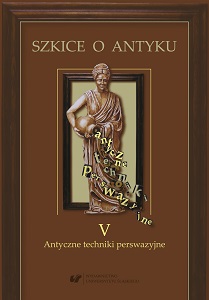Oblężenie Alezji i perswazja Cezara w mowie Kritognata (Gall. VII 77)
The siege of Alesia and Caesar’s persuasion in Critognatus’ speech (Gall. VII 77)
Author(s): Anna Zawadzka
Subject(s): Philology
Published by: Wydawnictwo Uniwersytetu Śląskiego
Keywords: Critognatus’ speech; Caesar; persuasion; Commentarii de bello Gallico;
Summary/Abstract: The fact that in the Commentarii de bello Gallico the Gauls themselves pronounce certain opinions and reflections on their own way of acting is by no means meant by Caesar to provide their self-portrait, but is yet another persuasive strategy used in order to prove his case before his Roman audience. Critognatus’ speech is of key significance in constucting the ideological message in Book 7 of Commentarii de bello Gallico. 52 B.C. marks a critical moment in Caesar’s conquest of Gaul, which united its forces under Vercingetorix in an effort to liberate Gaul from the Romans. The point Caesar attempts to make in Commentarii is that the source of the Gauls’ military success lies in their effective adoption and wide-scale implementation of Roman paradigms of war: key elements of Roman warcraft, such as engineering works, as well as the Roman concept of virtus, which involved perseverance in enduring adversities rather than impulsive attacking the enemy typical of the Gauls. Yet, the plan designed by Critognatus to maintain the besieged Alesia awaiting relief forces was utterly barbarian and, what was more, patterned on their ancestors (maiores): namely, cannibalism, described by Caesar as “extraordinary and nefarious cruelty” (singularis ac nefaria crudelitas). Thus Critognatus’ speech should leave no doubt that the Gauls’ adopting the Roman paradigms, as presented in Book 7 of Commentarii, is only superficial. Helpful in fulfilling their immediate aims, the Roman civilization did not in fact affect the Gauls’ genuine nature. Caesar’s intention was to provide Critognatus’s speech as undeniable evidence that the conquest of Gaul, which he had pursued for six years and which was contested by his political enemies in Rome, was not only bellum iustum, but also Rome’s civilizing mission and moral duty (fas).
Book: Szkice o antyku T 5. Antyczne techniki perswazyjne.
- Page Range: 77-91
- Page Count: 15
- Publication Year: 2019
- Language: Polish
- Content File-PDF

